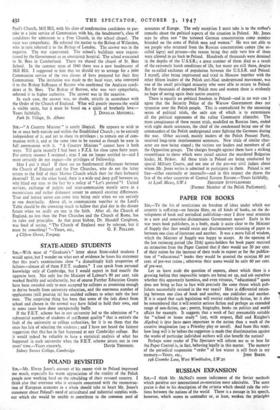PAPER FOR BOOKS
Snt,—To the list of restrictions on freedom of ideas under which our country is suffering—on foreign films, on all kinds of books, on the de- velopment of book and' periodical publishing—may I draw your attention to a new and somewhat disingenuous Government move? Early in the war years book publishers, in a body, made it quite clear to the Minister of Supply that they would resist any discriminatory rationing of paper as between one class of literature and another. It was a move full of wisdom, which the Minister of Supply was happy to accept. At the opening of the last rationing period (the 25th) quota-holders for book paper received an intimation from the Paper Control that if they would use 20 per cent. of their ration for the increase of their trade in export or for the publica- tion of " educational " books they would be granted the existing 80 per cent. of pre-war ration ; otherwise their quota would be only 60 per cent. of pre-war.
Let us leave aside the question of exports, about which there is a growing feeling that impossible targets are being set up, and ask ourselves whether this apparently harmless, and even virtuous, " educational " quota does not bring us face to face with precisely the same threat which pub- lishers successfully resisted in the war years? Here is differential ration- ing between one class of .book and another, one publisher and another. If it is urged that such legislation will restrict rubbishy fiction, let it also be remembered that it will restrict serious fiction and perhaps an extended range of non-fiction, too ; poetry, biography, books on politics and world affairs for example. It suggests that a work of fact presumably suitable for " school or home study " (say, with respect, Hall and Knights's Algebra) is ipso facto more important to the nation than a work of the creative imagination (say a Priestley play or novel). And from this stage, how long will it be before the suggeston is made that discrimination against the works of particular individual authors will also benefit the nation?
Perhaps some reader of 'The Spectator will inform me as to how far the Paper Control is, in fact, behaving legally in this matter. The memory of the periodical suspension " order " of last winter is still fresh in my memory.—Yours, etc., JOHN BARER. 196 Coombe Lane, West Wimbledon, S.W.2o


































 Previous page
Previous page